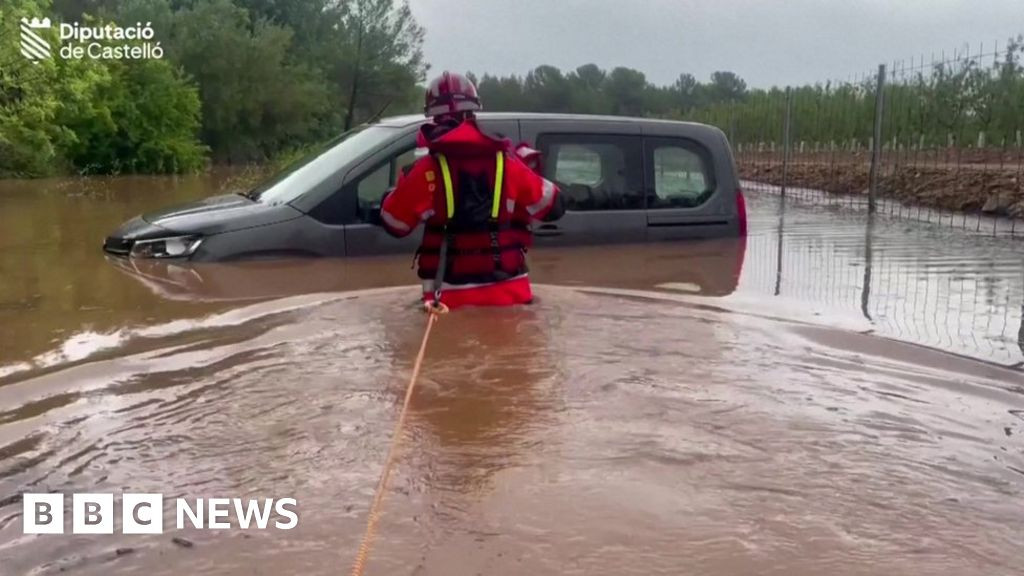Torrential Rains Unleash Devastating Flash Floods in Spain, Killing Dozens
Spanish Prime Minister Pedro Sanchez says “we won’t abandon you” in an address to the nation after flash flooding killed at least 62 people in the country's south-east. The death toll is expected to rise as authorities continue to search for missing people.
Footage uploaded to social media shows floodwaters causing chaos, knocking down bridges and dragging cars through the streets. In the town of Chiva, near Valencia - a tourist hotspot - more than a year's worth of rain fell in just eight hours.
Aftermath of the Floods
Over 100,000 households are without electricity, a local provider says, as football matches and trains have been cancelled across the region. Some affected municipalities include Carlet, Montserrat, Catadau, Montroy and Benimodo. Repair work may take time due to the conditions, the company adds.
We’re seeing pictures now from Picanya, near Valencia in eastern Spain, where buildings have been damaged and cars left stranded in the streets.
International Response and Support
The President of the European Parliament, Roberta Metsola, says “Europe is ready to help” after what she calls the “catastrophic consequences” of flooding on Spain's south and east coast. In a statement on X,, external she gives her solidarity to all affected and says she is grateful to the emergency workers “who are doing everything they can to help people in need”.
Sanchez finishes his remarks with a plea to residents in affected areas to listen to warnings being issued by officials. The German government has also offered its help to Madrid, a spokesperson in Berlin said on Wednesday. “We are in direct contact with the Spanish government as to whether there should be support from Germany for this terrible disaster,” the spokesperson said, according to Reuters.
Blame and Response
The regional government of Valencia has faced criticism for allegedly failing to prepare sufficiently for the flash floods. “There are governments which privatise and dismantle when they arrive in institutions and there are governments who are proud of that,” said Gabriel Rufián, of the Catalan Republican Left (ERC). He was referring to the conservative administration of Carlos Mazón, who eliminated the Valencia Emergency Unit (UVE) on taking office in 2023, on the grounds that it was inefficient.
Speaking on the radio, Mr Mazón defended his handling of the crisis, saying that “the experts talk about an absolutely unprecedented situation”. He also responded to claims that warnings about the floods had not been robust enough, saying that they had been provided “in the correct way”.
Impact on Transportation and Infrastructure
State railway company Adif says trains on the high-speed Madrid-Valencia and Barcelona-Valencia are cancelled. Suburban trains around Valencia are also affected, though Adif adds that some lines may be “subject to the evolution of the weather”. Some football matches have also been cancelled because of the weather, including:
- Valencia CF have expressed their “sincere condolences” to those who have died, adding in a social media post that it was ready to help authorities in “any way possible”. They have also postponed their Copy Del Rey clash with Parla Escuela, which was due to take place this evening in Madrid.
Weather Patterns and Climate Change
BBC Weather's Matt Taylor has taken a look at what has caused the flash floods, as the region in south-eastern Spain saw more than a year's worth of rainfall in eight hours. The heavy rainfall has been put, in part, down to a Dana phenomenon, in the video below Matt explains what this means.
The intense rain has been attributed to the gota fría, or “cold drop”, which occurs when cold air moves over the warm waters of the Mediterranean Sea. This creates atmospheric instability, causing warm, saturated air to rise rapidly, leading to the formation of towering cumulonimbus clouds in a matter of hours and dumping heavy rain across eastern parts of Spain.
Climate scientists have warned that torrential rains are set to get stronger as the planet heats up. Ernesto Rodríguez Camino, senior state meteorologist and member of Spanish Meteorological Association, said: “These types of intense and exceptional, rare rainfall events are going to become more frequent and more intense and, therefore, destructive.” He said scientists would be able to quantify the role of climate change after the event but could not do so on the fly.
Moving Forward
The death toll will likely rise with other regions yet to report victims and search efforts continuing in areas with difficult access. Spain is still recovering from a severe drought and continues to register record high temperatures in recent years. Scientists say increased episodes of extreme weather are likely linked to climate change. Rainfall warnings continue through Wednesday for portions of eastern and southern Spain, according to Spain’s Meteorological Agency, AEMET, with the threat of heavy rain expected to continue through the end of the week.
This tragedy is a stark reminder of the devastating impact that extreme weather events can have, and it highlights the need for improved preparedness and adaptation strategies in the face of a changing climate.

















